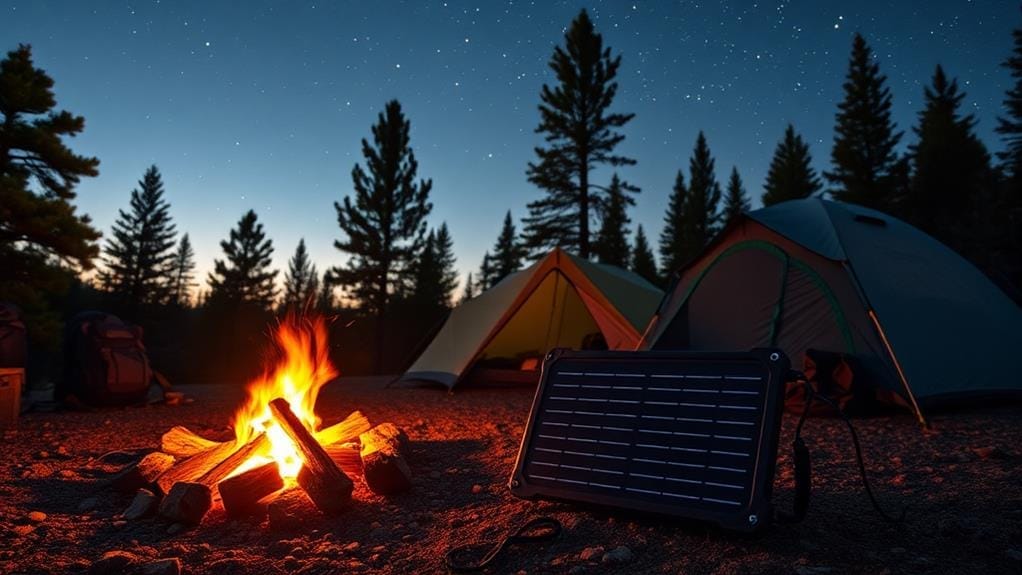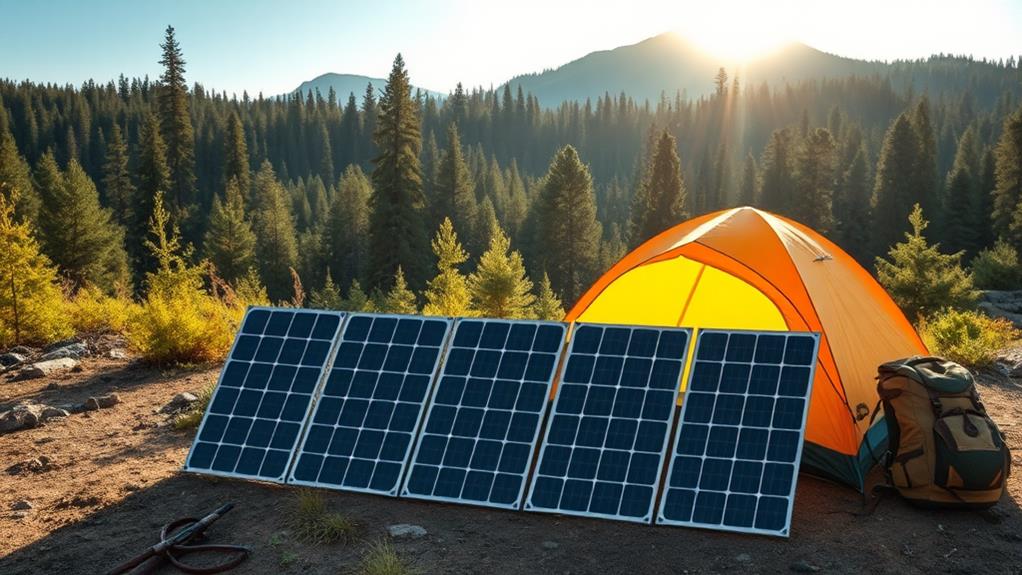In 2026, top solar generators for mini fridges offer efficient off-grid cooling solutions. The Jackery Solar Generator 240 v2 provides 256Wh with 300W AC output, while EcoFlow RIVER 2 Max boasts 512Wh and 1000W output. EF ECOFLOW’s RIVER 3 and RIVER 2 Pro offer 245Wh and 768Wh capacities, respectively, with fast charging capabilities. A portable 280Wh option with a 60W foldable panel suits budget-conscious users. EF ECOFLOW’s RIVER 2 rounds out the list with its compact 256Wh design. Key factors include power output, battery capacity, charging time, portability, and safety features. LiFePO4 batteries dominate, offering 3000+ charge cycles. Further exploration will reveal detailed specifications and performance metrics for informed decision-making.
Key Takeaways
- Solar generators for mini fridges should have a continuous output rating exceeding 100 watts to handle running wattage.
- LiFePO4 batteries offer over 3000 charge cycles, making them ideal for long-term off-grid use.
- Fast charging capabilities, like 0-100% in 1-2 hours, ensure quick power restoration for uninterrupted cooling.
- Portability is crucial; look for generators under 15 lbs with built-in handles for easy transport.
- X-Boost technology allows generators to temporarily handle higher wattages, useful for mini fridge compressor activation.






Jackery Solar Generator 240 v2 with 40W Mini Solar Panel
- Long-lasting Performance: Built to last for over 10 years with a durable LiFePO4 battery, the Solar Generator 240 2024 New Version offers a reliable...
- Versatile Charging Options: Delivering convenient 1-hour fast charging, the Solar Generator 240 V2 is fully charged in just 1 hour. Recharging from 0%...
- Multi-port Charging Hub: 100W PD USB-C ports on the Solar Generator 240 V2 support direct USB-C fast charging for a range of digital devices, without...
Last update on 2026-01-12 / Affiliate links / Images from Amazon Product Advertising API
The Jackery Solar Generator 240 v2 with 40W Mini Solar Panel is an ideal choice for outdoor enthusiasts who need reliable power for their mini fridges and other small appliances. This compact powerhouse boasts a 256Wh LiFePO4 battery, 300W AC output, and 100W USB-C output, ensuring you’ve got ample power for your devices. With over 3,000 charge cycles and a lifespan exceeding 10 years, it’s built for long-term performance. The unit’s versatile charging options include fast charging via the app in just 1 hour, AC wall outlet charging in under 2 hours, and solar charging in 3 hours with 100W input. At 7.7 lbs, it’s highly portable for camping and travel. The multi-port charging hub, featuring 100W PD USB-C ports, allows for efficient charging of various devices, while the built-in camping light serves as emergency illumination.
Best For: Outdoor enthusiasts, campers, and travelers who need a portable, reliable power source for small appliances and devices during their adventures.
Pros:
- Lightweight and compact design at 7.7 lbs, making it highly portable for outdoor activities
- Versatile charging options, including fast charging via app and solar charging capabilities
- Long-lasting performance with over 3,000 charge cycles and a 10+ year lifespan
Cons:
- Some users reported issues with solar charging compatibility, requiring additional adapters
- Limited power output may not be sufficient for larger appliances or extended off-grid use
- Additional cords or adapters may need to be purchased separately for certain devices
EcoFlow RIVER 2 Max Solar Generator with 160W Solar Panel
- [Charge Anywhere] Replace your outdoor generator with clean, renewable energy. Recharge RIVER 2 Max with this lightweight, portable solar panel...
- [Power 80% of Home Appliances] With an output of up to 1000W, run 11 devices at the same time without overloading.
- [Runs for Years] LiFePO4 battery technology provides RIVER 2 Max with 3000+ charging cycles, so you can keep powering devices for almost 10 years. LFP...
Last update on 2026-01-13 / Affiliate links / Images from Amazon Product Advertising API
For those seeking a compact powerhouse with lightning-fast charging capabilities, EcoFlow’s RIVER 2 Max Solar Generator with 160W Solar Panel stands out from the crowd. This 512Wh LiFePO4 portable power station offers impressive specifications, including a 60-minute full charge time and a 3000+ cycle lifespan. With up to 1000W output and the ability to power 11 devices simultaneously, it’s an ideal solution for powering mini fridges and other appliances during outages or outdoor adventures. The RIVER 2 Max’s versatility is evident in its multiple charging options, including solar, AC, car outlet, and USB-C, while its integrated power adapter enables efficient 600W/hour charging. Users appreciate its performance in real-world scenarios, such as camping trips and hurricane preparedness, citing its reliability and ease of use. Compared to competitors, the RIVER 2 Max offers superior value and unique features like a 60W PD output.
Best For: Outdoor enthusiasts, homeowners seeking reliable backup power, and travelers needing a portable, fast-charging power solution for multiple devices.
Pros:
- Incredibly fast 60-minute full charge time
- Versatile charging options including solar, AC, car outlet, and USB-C
- Compact and lightweight design with high power output (1000W)
Cons:
- Some users reported Wi-Fi connectivity issues with the companion app
- Higher price point compared to some basic portable power stations
- Solar panel charging time (4 hours) is significantly longer than AC charging
EF ECOFLOW Portable Power Station RIVER 3 (245Wh LiFePO4 Battery)
- [Industry-leading GaN Technology] With groundbreaking X-GaNPower, RIVER 3 revolutionizes energy efficiency, delivering double runtime for appliances...
- [1 Hour Fast Charging] Fast AC charging from 0-100% in 1 hour with X-Stream technology. No adapter required, only one cable is needed for charging. Or...
- [Long-lasting and Safe] With an upgraded LFP battery, charge and recharge 3000+ times for 10 years of power. Built in X-Guard tech, an advanced...
Last update on 2026-01-12 / Affiliate links / Images from Amazon Product Advertising API
Compact and powerful, the EF ECOFLOW Portable Power Station RIVER 3 is ideal for campers and homeowners who need a reliable backup power source for mini fridges and other small appliances. This 245Wh LiFePO4 battery-powered unit boasts a 300W AC output, expandable to 600W with X-Boost technology, and features industry-leading GaN technology for extended runtime. The RIVER 3’s fast-charging capabilities are impressive, with AC charging from 0-100% in just 1 hour using X-Stream technology, while 110W solar input can fully charge the unit in 2.6 hours.
Weighing only 7.8 lbs and measuring 8.2L x 4.5W x 10H inches, the RIVER 3 is 30% smaller than the industry average, making it highly portable. It offers UPS functionality with auto-switching in <20 ms during power outages, operates quietly at <30 dB, and provides IP54 battery protection for enhanced durability in various environments.
Best For: Best for campers, outdoor enthusiasts, and homeowners seeking a compact, lightweight, and fast-charging portable power station for small appliances and emergency backup.
Pros:
- Rapid charging capabilities with 0-100% AC charging in just 1 hour
- Lightweight and compact design, 30% smaller than industry average
- Quiet operation (<30 dB) with UPS functionality for power outages
Cons:
- Limited 245Wh capacity may not be sufficient for powering larger appliances
- Higher price point compared to some competitors with similar capacity
- Some users may prefer a larger unit with more power outlets
EF ECOFLOW Portable Power Station RIVER 2 Pro (768Wh)
- [Fastest Charging in the Industry] - Fully recharge using an AC outlet in only 70 minutes with EcoFlow’s X-Stream fast charging technology.
- [Power 80% of Your Appliances] - With an output of up to 1600W, run 80% off all your appliances, even high wattage ones. With 11 outlets, from 800W AC...
- [LFP Long-Life Battery] - Using LFP battery cells, use and recharge RIVER 2 Pro more than 3000 times before hitting 80%. That’s almost 10 years of...
Last update on 2026-01-12 / Affiliate links / Images from Amazon Product Advertising API
Outdoor enthusiasts and RV owners will appreciate the EF ECOFLOW Portable Power Station RIVER 2 Pro’s impressive charging capabilities. With a 768Wh LiFePO4 battery, this unit can be fully recharged in just 70 minutes using an AC outlet, or in 3.5 hours with a 220W solar input. The RIVER 2 Pro boasts a running power of 800W, expandable to 1600W with X-Boost technology, supporting 80% of appliances, including high-wattage devices. Its 11 power outlets, comprising 4 AC outlets and USB-C ports, offer versatile connectivity options.
The RIVER 2 Pro’s durability is remarkable, featuring over 3000 recharge cycles before reaching 80% capacity, equating to approximately 10 years of use. An advanced Battery Management System (BMS) monitors voltage, current, and temperature, ensuring peak performance. Weighing 17.2 lbs with a built-in handle, this portable power station is ideal for camping, RVs, and home use, backed by a 5-year service warranty.
Best For: Outdoor enthusiasts, RV owners, and homeowners seeking a reliable, fast-charging portable power source for various devices and appliances.
Pros:
- Exceptionally fast charging time of 70 minutes using AC outlet
- Versatile power output with 11 outlets and support for high-wattage devices
- Long-lasting LiFePO4 battery with 3000+ recharge cycles and advanced BMS
Cons:
- Relatively high price point compared to lower capacity portable power stations
- Weight of 17.2 lbs may be heavy for some users to carry long distances
- X-Boost feature may not support all high-wattage appliances consistently
Portable Solar Generator with 60W Foldable Solar Panel (300W, 280Wh)
- Portable Generator with 60W Solar Panel Included: with a big battery pack, ZeroKor 300W power stations Generator are powerful enough to charge...
- Multiple Charging outlets for camping gear with SOS Flashlight: with 2* 110V/300W Max AC outlets, 1* DC port (9V-12.6V/10A max ), 3* 5V/3A MAX USB...
- Multiple Charging Optional, Solar Panel 60W Included: ZeroKor portable power bank generator can be recharged by wall AC outlet, DC5521 Solar Panel...
Last update on 2026-01-12 / Affiliate links / Images from Amazon Product Advertising API
With its 280Wh lithium battery pack and 60W foldable solar panel, this portable solar generator is a versatile choice for those needing reliable power on the go. The unit supports multiple charging options, including two 110V AC outlets (300W max, pure sine wave), a DC port, and various USB ports, making it suitable for powering smartphones, tablets, laptops, and small camping equipment. The monocrystalline solar panel boasts a 20.5% conversion efficiency, outperforming polycrystalline alternatives in low-light conditions. However, users should note that the actual continuous power output may be lower than advertised, with some reporting less than 100W. The generator’s built-in Battery Management System (BMS) provides thorough protection against short circuits, over-current, over-voltage, overload, and overheating, ensuring safe operation. To maintain ideal battery capacity, it’s recommended to keep the charge level between 60% and 80%.
Best For: This portable solar generator is best for outdoor enthusiasts, campers, and individuals seeking a reliable backup power source for small devices during short trips or power outages.
Pros:
- Versatile charging options with multiple ports for various devices
- High-efficiency monocrystalline solar panel for effective solar charging
- Comprehensive safety features with built-in Battery Management System
Cons:
- Actual continuous power output may be lower than advertised
- Issues with simultaneous charging and AC output use
- Limited capacity for powering high-wattage devices or extended use
EF ECOFLOW Portable Power Station RIVER 2 (256Wh)
- [1 Hour AC Recharge] - Fully recharge the electric generator using an AC outlet in only 1 hour with EcoFlow's X-Stream fast charging technology.
- [Power All Your Essentials] - With an output of up to 600W, run 6 essential appliances simultaneously without worrying about overloading. With a whole...
- [LFP Long-Life Battery] - Using LFP battery cells, use and recharge RIVER 2 more than 3000 times before hitting 80%. That's almost 10 years of regular...
Last update on 2026-01-12 / Affiliate links / Images from Amazon Product Advertising API
Boasting a 256Wh LiFePO4 battery and rapid charging capabilities, the EF ECOFLOW Portable Power Station RIVER 2 is ideal for campers who need reliable power for their mini fridges and other small appliances. This lightweight generator, weighing only 7.7 lbs, delivers up to 600W AC output through two outlets, ensuring you’ve got ample power for your off-grid needs. The RIVER 2’s X-Stream technology allows for a full recharge in just 1 hour via AC, while solar recharging takes as little as 2.3 hours with 110W input.
The unit’s impressive battery longevity, offering over 3000 recharge cycles before reaching 80% capacity, translates to nearly a decade of regular use. With a 5-year warranty and thorough package including AC and car charging cables, the RIVER 2 stands out as a durable, efficient choice for powering mini fridges during camping trips or emergencies.
Best For: Campers and outdoor enthusiasts who need a lightweight, portable power source for small appliances like mini fridges during short trips or emergencies.
Pros:
- Rapid charging capabilities with 1-hour full recharge via AC and 2.3-hour solar recharge
- Long-lasting LiFePO4 battery with over 3000 recharge cycles
- Lightweight and portable at only 7.7 lbs with a built-in handle
Cons:
- Limited 256Wh capacity may not be sufficient for powering larger appliances or extended use
- Solar charging cable not included in the package
- Maximum output of 600W may not be enough for some high-power devices
Factors to Consider When Choosing a Solar Generator for Mini Fridge

When selecting a solar generator for your mini fridge, you’ll need to take into account several essential factors to guarantee peak performance and reliability. These factors include the power output requirements of your specific mini fridge model, the battery capacity of the solar generator, and the charging time needed to replenish the battery. Additionally, you should assess the portability and weight of the unit, as well as the efficiency of the solar panels, to determine the most suitable option for your needs.
Power Output Requirements
Choosing the right solar generator for your mini fridge hinges on understanding its power output requirements. You’ll need to account for both the starting wattage and running wattage of your mini fridge. The starting wattage, which can range from 600 to 1600 watts, is notably higher than the running wattage and is essential for the initial compressor activation. During regular operation, mini fridges typically consume between 50 and 100 watts.
To guarantee reliable performance, select a solar generator with a continuous output rating that exceeds your mini fridge’s running wattage. Additionally, consider generators equipped with X-Boost technology or similar features, allowing them to handle higher wattage requirements temporarily. Battery capacity is another vital factor; aim for a minimum of 256Wh to sustain your mini fridge for several hours, depending on its energy consumption and your desired runtime. When evaluating solar generators, assess the efficiency and type of solar panels used for charging. This will impact the generator’s ability to recharge quickly enough to meet the ongoing energy demands of your mini fridge during extended use, especially in off-grid scenarios.
Battery Capacity
Battery capacity stands as a fundamental factor when selecting a solar generator for your mini fridge. Typically ranging from 256Wh to over 700Wh for portable power stations, the capacity directly influences your fridge’s operational duration without recharging. Given that mini fridges generally require 50-100W of continuous power, a generator with a 256Wh capacity can sustain operation for approximately 2-5 hours, depending on the fridge’s energy consumption and the generator’s efficiency.
For extended runtimes and the ability to power additional devices simultaneously, you’ll want to take into account generators with higher capacities, such as 512Wh or 768Wh. This becomes vital during outdoor activities or power outages. When evaluating battery chemistry, lithium iron phosphate (LiFePO4) batteries, common in solar generators, offer superior performance with lifespans exceeding 3000 charge cycles and enhanced thermal stability. It’s essential to understand your mini fridge’s power requirements, including starting and running wattage, to verify your chosen generator can effectively handle both peak and continuous load demands. By carefully reflecting on these factors, you’ll be well-equipped to select a solar generator that effectively meets your mini fridge’s energy needs.
Charging Time
The sun’s rays play an important role in determining the charging time of your solar generator. When selecting a generator for your mini fridge, you’ll need to take into account the input power of the solar panel, as this greatly affects charging duration. A 100W solar input, for instance, can fully charge a generator in approximately 3 to 4 hours under ideal sunlight conditions. However, it’s vital to account for weather variations, as cloudy days can extend charging times beyond typical ranges.
For faster recharging, look for generators with AC fast charging capabilities. These models can replenish their batteries in as little as 1 hour when connected to a wall outlet, ensuring quick turnaround for your power needs. Remember, the total battery capacity of your chosen generator will impact charging time; larger batteries naturally require longer periods to reach full charge. When evaluating solar generators, compare the panel wattage to battery capacity ratio, and evaluate your local climate. This information will help you estimate realistic charging times and determine if the generator can meet your mini fridge’s power requirements consistently, even during periods of limited sunlight.
Portability and Weight
Frequently overlooked, portability and weight are vital factors when selecting a solar generator for your mini fridge. When considering off-grid cooling solutions, you’ll want to prioritize units weighing under 15 lbs, as these offer enhanced mobility for outdoor activities and travel scenarios. Built-in handles additionally augment portability, allowing for effortless transportation between locations. Moreover, compact dimensions play a key role in optimizing space utilization, particularly in confined environments like camping setups or recreational vehicles.
While evaluating portability, don’t neglect battery capacity. A minimum of 256Wh is necessary to power a mini fridge for several hours, but opting for higher capacities, such as 768Wh, can greatly extend runtime. This increased capacity guarantees prolonged cooling without frequent recharging, enhancing overall convenience. In addition, consider generators offering multiple charging options and rapid recharge times. These features prove invaluable during travel or emergencies when power sources may be limited or unreliable. By prioritizing portability, weight, and versatile charging capabilities, you’ll make certain your solar generator meets the demands of powering a mini fridge in various off-grid scenarios, maximizing both convenience and functionality.
Solar Panel Efficiency
Solar panel efficiency often plays a fundamental role when selecting a solar generator for your mini fridge. When evaluating options, you’ll want to take into account panels with conversion rates above 20%, as these high-efficiency models will enhance your energy production. Monocrystalline panels, known for their superior efficiency compared to polycrystalline alternatives, are particularly effective in low-light conditions and space-constrained environments. They’re an ideal choice if you’re operating in areas with limited sunlight exposure or need to improve your available surface area.
It’s essential to factor in the impact of temperature on panel performance, as efficiency can decrease in high-heat situations. Look for panels rated for peak output across various temperature ranges to guarantee consistent performance. Additionally, you’ll need to maintain your panels regularly, keeping them free from shade and debris, which can considerably reduce their efficiency. While panel efficiency is crucial, remember that your solar generator’s overall effectiveness in powering a mini fridge also depends on its battery capacity and inverter output. These components must be sized appropriately to meet your appliance’s power requirements, ensuring a reliable and efficient off-grid cooling solution.
Multiple Charging Options
When selecting a solar generator for your mini fridge, it’s important to look beyond just panel efficiency and consider the unit’s charging versatility. You’ll want to choose a generator that offers multiple charging options, including AC outlets, USB ports, and DC ports, to accommodate your mini fridge and other devices you might need to power. Look for models that can fully recharge in a reasonable timeframe, ideally achieving 100% charge in under 2 hours via AC outlet or 3-4 hours using solar panels. Additionally, prioritize generators with high wattage output capabilities, up to 1000W, to support your mini fridge’s continuous power demands.
Opt for a solar generator that integrates solar charging with Maximum Power Point Tracking (MPPT) technology, which optimizes solar input and reduces charging times. Evaluate the total number of power outlets available; a generator with multiple AC, USB, and DC outlets will allow you to run your mini fridge alongside other essential devices during outdoor activities or power outages. By choosing a solar generator with diverse charging options and efficient power management, you’ll guarantee your mini fridge stays operational in various off-grid scenarios.
Safety Features
As you evaluate solar generators for your mini fridge, it is crucial to prioritize safety features. Look for models equipped with built-in Battery Management Systems (BMS) that offer thorough protections against short circuits, over-current, over-voltage, overload, and overheating. These safeguards guarantee the generator operates safely when powering your mini fridge.
Select solar generators with UL certifications and TÜV SÜD certified solar panels, as these provide assurance of shock resistance and fire protection. Additionally, consider units with an automatic UPS function that can switch to backup power in less than 20 milliseconds during blackouts, maintaining uninterrupted operation of your mini fridge. Opt for generators that operate at low noise levels, preferably under 30 dB, to minimize disturbances in residential or camping environments. Confirm the chosen model includes a temperature-activated cooling fan system to prevent overheating during extended use, especially when powering high-wattage appliances like mini fridges. By prioritizing these safety features, you’ll be able to select a solar generator that not only meets your power needs but also provides peace of mind through reliable, safe operation.
Frequently Asked Questions
How Long Does It Take to Fully Charge a Solar Generator?
You’ll find that charging times for solar generators vary greatly based on several factors. The generator’s capacity, measured in watt-hours (Wh), and the solar panel’s output, measured in watts (W), are primary determinants. Typically, you’re looking at 4-12 hours for full charge using solar panels, depending on sunlight conditions. With AC power, it’s often faster, ranging from 2-8 hours. It’s essential to consult your specific model’s specifications, as manufacturers provide detailed charging time estimates.
Can Solar Generators Power Other Appliances Simultaneously With a Mini Fridge?
Like a power-hungry orchestra conductor, your solar generator can indeed orchestrate multiple appliances simultaneously. You’ll find that most modern solar generators can power a mini fridge alongside other devices, depending on their capacity and output. Your generator’s wattage rating, typically ranging from 500W to 3000W+, determines its multitasking ability. It’s essential to calculate your total power requirements, considering each appliance’s wattage and runtime, to guarantee your generator can handle the combined load without overloading or rapid depletion.
What Maintenance Is Required for Solar Generators?
You’ll need to perform regular maintenance on your solar generator to guarantee peak performance and longevity. This includes cleaning the solar panels to remove dust and debris, checking and tightening electrical connections, inspecting cables for wear, and monitoring battery health. You should also periodically test the system’s output and efficiency, update firmware if applicable, and lubricate moving parts like cooling fans. It’s essential to follow the manufacturer’s guidelines for maintenance intervals and procedures, as requirements may vary between models.
Are Solar Generators Weatherproof for Outdoor Use?
Like a fortress in the face of nature’s fury, solar generators aren’t inherently weatherproof. You’ll find that most units are designed for indoor use or temporary outdoor setups. However, some models offer IP65 or IP67 ratings, indicating protection against dust and water ingress. To guarantee outdoor durability, you’ll need to invest in weatherproof enclosures or covers. Additionally, consider factors such as operating temperature range, humidity tolerance, and UV resistance when selecting a solar generator for prolonged outdoor use.
Can Solar Generators Be Used Indoors With Artificial Light Sources?
You can’t effectively use solar generators indoors with artificial light sources. These generators rely on photovoltaic panels designed to capture sunlight’s specific wavelengths and intensities. Indoor lighting, whether incandescent, fluorescent, or LED, doesn’t provide sufficient energy or the correct spectrum for efficient solar charging. While some minimal charging might occur under very bright artificial light, it’s impractical and inefficient. For ideal performance, you’ll need to place the solar panels outdoors in direct sunlight to harness solar energy effectively.















